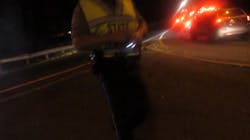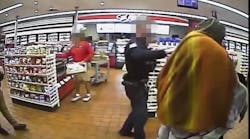WEST HARTFORD, Connecticut -- A state police internal affairs investigator concluded there was “no evidence” to support an activist’s claim that three troopers conspired to concoct charges against him during a contentious interaction at a DUI checkpoint in 2015.
Michael Picard, who supports the open carrying of firearms and opposes random DUI checkpoints, was charged with two infractions while protesting at an I-84 ramp in West Hartford.
Police seized Picard’s camcorder during the confrontation, which, unbeknownst to the troopers involved, captured them discussing whether to file charges. In the audio, one trooper is heard stating that the officers “gotta cover our ass,” while another adds they could “claim that, um, in the back-up, we had multiple people stop to report” a man with a gun.
All of the troopers — now retired Trooper First Class John Barone, Sgt. John Jacobi and Master Sgt. Patrick Torneo — were exonerated, with the investigator accepting their explanations for their statements.
Barone told the investigator that he was trained to always create some sort of documentation — such as issuing an infraction — any time he puts his hands on someone, and “that ‘cover your ass’ is merely an expression which he has created over the years,” according to the investigator’s report.
Torneo, a 15-year member of state police, told the investigator he used the term “claim” only because another trooper, Jacobi, told him that none of the motorists who said they saw Picard with a gun had stopped to give a report. “Based on that information he advised Sergeant Jacobi that Trooper Barone would have to ‘claim’ that witnesses had reported to him the information.”
The internal affairs report was completed nearly a year ago, but the state Department of Emergency Services and Public Protection, which includes the state police, would not disclose it, citing a provision in the union contract that allows troopers to object to the release of any personnel records they believe would violate their privacy, while also requiring the department to support that position before the Freedom of Information Commission.
The state Supreme Court has ruled that police internal affairs reports must be released, even in cases where the officers are exonerated. On Tuesday, during a hearing before the commission, a state police union lawyer said the troopers had withdrawn their objection to releasing the report. The hearing was adjourned and the 62-page report was released Thursday morning.
The confrontation began as troopers were checking for drunken drivers on Sept. 11, 2015.
Barone said a female driver who “appeared frazzled” pointed toward Park Road saying there was a man “waving a gun around in his hand holding a sign.” Barone said that he tried to call in the report of a man waving a gun, but that his portable radio malfunctioned.
Soon after, Jacobi said another driver at the spot check told him there was a man in the road with a gun.
Barone said he then ran toward Picard’s location, with his gun drawn, to “take care of the threat.”
As he approached Picard, Barone said, he saw that Picard’s gun was holstered, but that he was holding the camcorder, which Barone said he seized in order to confiscate anything that could be used as a weapon.
On the videotape, however, Barone is heard telling Picard “It’s illegal to take my picture” as he reaches for the camcorder. Although there is no such law, the internal affairs report did not address that part of the confrontation.
When Jacobi, Barone, and another trooper approached Picard, Jacobi said Picard was not cooperative.
“Barone described this incident as a very dangerous one; where [Barone] almost shot Picard,” the internal affairs investigator, Capt. Stavros Mellekas, wrote.
When Barone approached Torneo’s cruiser, he learned that Picard was involved and recalled that Picard had had dealings with Hartford police in similar incidents, he said.
“Torneo subsequently made a telephone call to a Hartford Lieutenant [Lt. Rob Allen] to obtain background on Picard,” Mellekas wrote.
Jacobi said troopers confiscated Picard’s gun and discussed charges and “elements of crimes.” Jacobi said that, based on his findings, the charges rose to the level of an infraction, and Picard was issued tickets for creating a public disturbance and reckless use of the highway. Jacobi said he told Picard he could continue to protest but not on the I-84 ramp.
The charges were later dropped.
In the report, the Mellekas suggested that it was possible the motorists who reported a man with a gun were actually plants working with Picard, based in part on a videotape of a similar confrontation from May 2016, after a 911 caller reported two armed men in a McDonald’s parking lot in Manchester. Officers responded and handcuffed the men, including Picard, who can be heard shouting “This is unlawful.”
“The pre-described incident is another example of precarious activity by Picard and his associates which causes law enforcement to take action; to which he [Picard] subsequently will critique and dramatize over social media,” Mellekas wrote. “It also leads a reasonable person to question if the 9-1-1 call was placed by an associate of Picard to expedite the response, to which he was prepared to record by video camera. It should be noted that the 9-1-1 caller did not remain on scene as similar to the unidentified female reporting the crime to Trooper Barone on 09-11-2015” — the date of the incident in West Hartford.
A former state police lieutenant colonel initiated the complaint in January 2016 — after Picard posted a video of the interaction on YouTube — to determine if the three troopers improperly detained Picard or otherwise exhibited conduct that would reflect negatively on the department.
Mellekas, who investigated the claims, said that a copy of the video was not provided with the complaint, but that he found a copy of a 7 minute, 29 second video on YouTube titled “Gotta Cover Our Ass. — Connecticut State Police.”
Mellekas said the video is shot from a first-person view, is obscured at times and “appears to jump from scene to scene of multiple interactions with Police.”
All three troopers said the video, as edited by Picard, did not accurately portray what happened that night.
Picard’s lawyer, Joseph Sastre, declined to comment on details of the report Thursday, but said it wasn’t based on a complaint by his client and would not affect a civil suit Picard has filed against the three troopers.
“The state police command initiated the internal ‘investigation’ themselves after the story broke months after Michael's arrest,” Sastre wrote in response to an inquiry by The Courant. “That the state police concluded the investigation by exonerating themselves should surprise nobody. We never made a citizen's complaint. Because we never had any faith in them to conduct a legitimate internal affairs investigation.”
———
©2017 The Hartford Courant (Hartford, Conn.)
Visit The Hartford Courant (Hartford, Conn.) at www.courant.com
Distributed by Tribune Content Agency, LLC.



